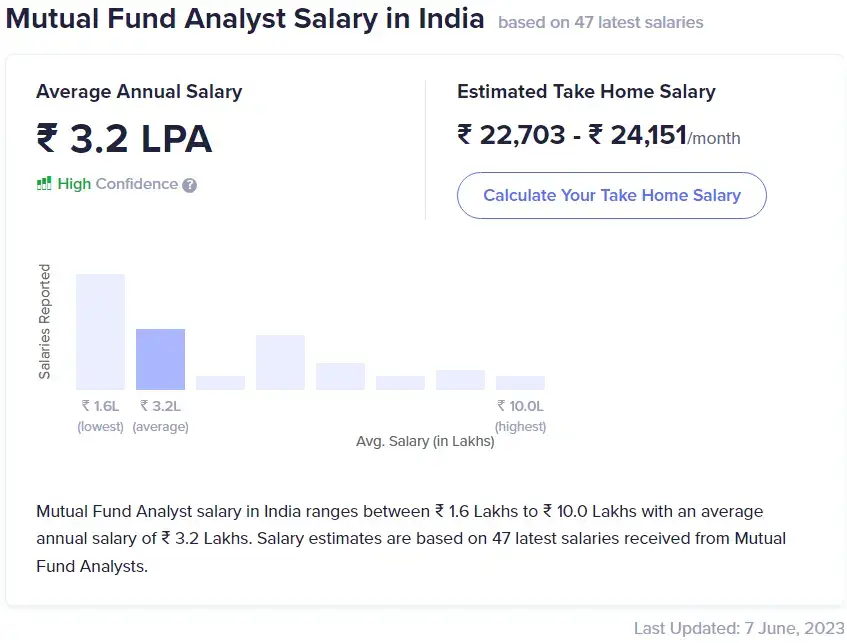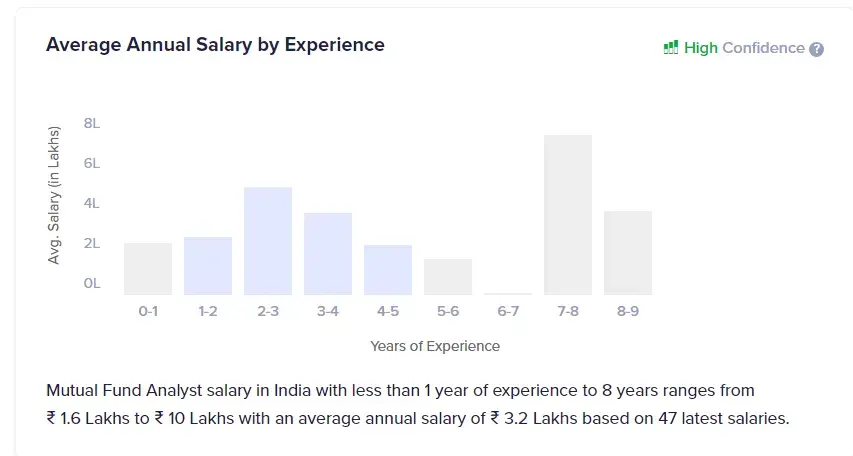What does it Take to be a Mutual Fund Analyst?

Here's What We've Covered!
Have you ever wondered why mutual funds exist?
They were invented to solve a problem. It is an interesting story that takes us back in time. Traditionally, people invested their money in fixed deposits, gold or real estate. The stock market changed everything. Suddenly, you could own a piece of a company and make money when they made a profit.
But how to choose the right stocks? There were thousands of them, each one performing at a different level. An ordinary person could not understand the many nuances involved.
Should I invest in Tata or Reliance?
Do I buy stock from one company or spread my money across several?
What if I don’t have the funds to buy multiple stocks but still want to diversify my portfolio?
The solution was simple, and so mutual funds came into existence. People pooled their hard-earned money, and asset management companies invested this collective fund into the financial markets. They distributed the money across various assets, such as stocks and bonds. The idea was to maximise the returns while restricting the risk levels. Suddenly, mutual funds became very popular amongst low-key investors. Once again, there were thousands of options to choose from.
This brought about another round of questions.
What funds work best for my financial needs?
How should I distribute my investment across various funds?
Should I put my money in equity or debt?
This is how the designation of mutual fund analyst was created. The world needed an investment specialist who uses their expertise to design a mutual fund plan that caters to specific individual needs. It’s a challenging and thrilling profession where you must have your pulse on the market and one eye on the stock prices.
Do you want to know how to become a mutual funds expert? Let’s find out.
What does a mutual fund analyst do?
Do you imagine a stressed-out professional shouting, ‘BUY!’ Or ‘SELL!’ On the phone all day? Then you have been watching too many movies.
Here is the reality. A mutual fund analyst’s job is much more refined and methodical. A trained professional is calm and attentive, with a steel-trap mind for knowledge.
Competent analysts know the value of intensive research. They study the market, analyse the conditions, and monitor different assets and company performances. The job is a real workout for the brain. It is similar to when you join pieces of a puzzle and gain satisfaction when the picture is complete. After the research is done, the analyst is in a position to advise a client.
But before that, there is one more task at hand. Investors do not come with the same demands. Every individual will require a specialised investment plan.
Maybe one person is planning for retirement. Another wants to invest money for short-term goals such as a holiday or buying a car.
A mutual fund analyst, a good one, will listen. They pay attention to their clients. They ask the right questions, not the obvious ones. Once satisfied with the answers, they use their training and proficiency to make customised recommendations.
As a profession that requires skill, knowledge and analytical thinking, most successful mutual fund analysts are certified in CFA, CFP and financial modelling.
Also Read – 9 Steps You Should Follow To Successfully Become A Fund Manager
A day in the life of a mutual fund analyst:
- Conducting intensive market research while paying close attention to risks, volatility and irregularities.
- Analysing the debt and equity market for fund investment opportunities.
- Keeping track of any changes in net asset values (NAV).
- Creating reports about fund valuation and performances for investors.
- Building close relationships with clients to understand their financial goals and needs.
- Recommending a tailor-made mutual funds plan to customers.
- Studying new developments as and when they arise.
- Making changes or modifications according to the current investment climate.
- Always keeping eyes and ears open to ensure the entire process is smooth and seamless.
- Coming to work the next day to do it all over again.
Start your MF Analyst journey with IMS Proschool
How to become a mutual funds analyst?
Asset management companies, mutual fund houses and wealth management firms have one thing in common. They are always on the lookout for qualified and efficient mutual fund analysts who can make them a lot of money.
Do you want that to be you? All that is standing between you and a mutual fund analyst job is your qualification. Mutual funds are a niche industry within the investment sector. If you want to be taken seriously, here are the requirements.
Educational criteria:
- MBA
A post-graduate finance degree opens up many doors in the industry. An MBA in finance can get you into the ground floor of the top mutual fund firms. Most MBA holders possess finance and management skills that enable them to analyse the markets and lead a team of researchers.
- CFP
Charted financial planners receive a detailed and intense education in investment and estate planning. They are taught to understand the intricacies of a fluctuating market, how to meticulously plan for long-term goals and work with clients on a one-to-one basis. A CFP credential can play a big role in how you become a mutual fund analyst.
- CFA
One of the globe’s most renowned investment certifications, the CFA course empowers students to become specialists. The program is aimed at smart, analytical professionals who understand the financial markets and institutional investments. List this qualification on your resume, and you can nab a mutual fund analyst job in the company of your choice.
- NISM mutual funds distributor certification
Take the mandated NISM examination, and you are licensed to work in mutual funds anywhere in the country. You will receive the skill development and training to work in this industry and become a reliable mutual funds analyst.
- Financial modelling
At many points in your career, you will hold a financial statement. You have two options. You can hand it back with a shrug. Or, you can use it to understand valuation, company performances and make forecasts. Without a financial modelling qualification, you’re not going to get far in your profession. It helps you understand, analyse and monitor financial scenarios better. No surprise that the financial modelling course is viewed as a gateway to equity research programs and the CFA.
How to choose the best certification for the mutual fund analyst job:
- Carefully study the syllabus to ensure it covers all the essential requirements for your career.
- Speak to industry experts and former students about what qualifications work best in the industry.
- Visit reputed coaching institutions to speak to the faculty.
- Choose courses that offer real-world applications and hands-on training.
Skills that make you an in-demand mutual fund analyst
-
Accounting acumen
A proficient accountant can be a very successful mutual fund analyst. You need to know how to read the financial statements of various companies during your research. You also need to understand valuation, ratio analysis and historic fund performance. Your accounting skills
have a big part to play in your career, so hone them well.
-
Financial modelling expertise
What is the difference between an ordinary mutual fund analyst and a great mutual fund analyst? The latter will be an expert in financial modelling. They understand valuation, make forecasts and efficiently analyse investment opportunities. A financial modelling course makes you an MS Excel expert, cuts down your work time and gives you excellent results in a short time.
-
Communication skills
Do you know what is better than having good ideas? Convincing a client or investor to listen to your ideas. A large part of a mutual fund analyst’s job is working with people. Whether it’s the research team, clients, advisors, fund managers, supervisors or business executives, you need to be able to interact with all of them on a professional level. It’s not just verbal communication skills that are important. You have to write your reports, statements and recommendations eloquently and clearly. As a well-spoken and coherent mutual funds analyst, you will go far in your career.
-
An analytical, detail-oriented mind
At work, you read financial statements, decode graphs, understand market trends and examine future possibilities. After all of that, your real job begins. Analysing and scrutinising the various opportunities that came out of your research. An investigative mind will look for answers in every nook and corner. No stone is left unturned. Only then can you make the best possible decisions for your client.
-
Risk management
An investment advisory job is no walk in the park. There are many obstacles and challenges headed your way. A capable mutual fund analyst will assess potential risks before creating an investment plan. Conducting due diligence is essential, especially when so much money is at stake. Preemptive measures help a lot in this field. You have to analyse your research from every angle to ensure there are no avoidable pitfalls or losses.
Also Read – How a CFP certification can help mutual fund distributors
How to become a mutual funds analyst with IMS Proschool
When it comes to the quality of your education, never settle for anything other than the best. The right coaching institution will have your back. IMS Proschool is known across India as the first choice for many students pursuing professional training. With their high success rate and incredible facilities, it is easy to see why. The faculty contains only industry experts who are renowned in their chosen fields. They use their own experience as well as innovative learning methods to teach students. Proschool’s CFA, CFP and financial modelling courses are perfect for those aspiring to be mutual funds analysts.
Course details:
- Do you like attending classes at an offline centre or prefer studying online at home? Proschool offers both options, so the choice is yours.
- All teachers hold certifications in the course they teach.
- Proschool ensures students receive a well-rounded education by offering additional resources such as mock tests, practice papers, learning videos and prep books.
- There is a designated placement portal to help you apply for mutual fund analyst job openings.
Mutual fund analyst salary details
FAQS
Q1. How do mutual funds work?
Let’s say you have 100 rupees. You also have four other friends with a similar amount of money in their pockets. You pool all your cash together and hand it over to a mutual fund analyst who invests that amount in different types of securities. Over time, the investment gets a profitable return, which is divided among your friends and you.
Q2. What are some of the types of mutual funds?
- Equity funds
- Debt funds
- Money market funds
- Bond funds
- Stock funds
Q3. How to become a mutual fund analyst?
You need a good understanding of the financial markets. A CFA or CFP course with Proschool can help you learn core topics and skills in this industry. It can also open your mind and strengthen your analytical reasoning. A financial modelling program will also help. You need to know how to read and build models. Once your education is complete, you can apply for entry levels jobs with some of the leading mutual fund firms. Proschool offers placement assistance as well.
In conclusion
The mutual fund industry is doing very well for itself. From its humble beginnings in 1963, this sector has grown to contain Rs 41,61,822 crore as assets under management (AUM). If you want a slice of this pie, first learn how to become a mutual fund analyst. This post was the first step. Now it is time for your next move. What will you do?
Resent Post
>
Best Study Abroad Courses for Commerce Graduates
>
Emerging commerce career options in India (2026): From CA to Data Analyst
>
ACCA Opportunities You Didn’t Know About – Think Beyond Audit!
>
Which Courses After 12th Commerce With High Salary Are in Demand Worldwide?
>
How to Find ACCA Jobs Online After Qualifying: Real Portals, Tips & Career Guidance
Follow Us For All Updates!





